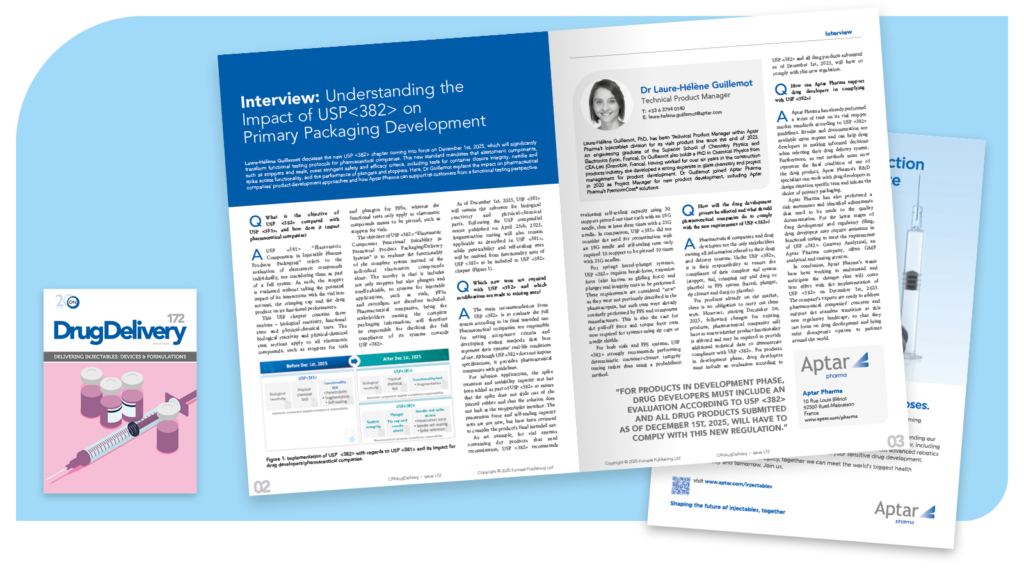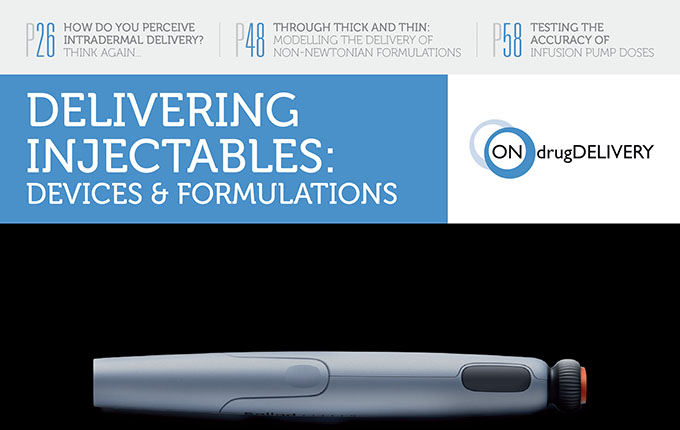When selecting a glass vial and rubber stopper for packaging a drug, whether it is a biotech component, vaccines or a small molecule, key compatibility criteria must be considered to ensure a perfect fit and that the drug stays protected at all times. Incompatibility issues may take the form of an excessive force required when inserting the stopper onto the vial, the stopper accidentally popping-off before having been crimped or even a loss of container closure integrity over time. All these events have the potential for putting the drug integrity at risk, which may in turn be detrimental to patients. As of the recently released USP<382>, it is now the responsibility of the drug manufacturer to demonstrate that their choice of primary packaging is fit for purpose. Choosing the right partner can help drug manufacturers derisk their operations and avoid compatibility issue that could greatly delay the commercialization of their product.
To address insertion forces, Aptar Pharma use a simple method that allow to track the force profile during the insertion process, therefore allowing for comparison of various process parameters or stoppers design. In this article, we confirm that the level of siliconization can help reduce insertion force and show that different lyophilization stopper combined with different vials can have a significantly different insertion profile.
When it comes to pop-off, our experts developed a comprehensive method that submit our vial/stoppers systems to conditions that may favor pop-off. This method allows to classify vial/stopper systems depending to their propension to resist popping-off. Once again, the result shows that these lyophilization stoppers/vial systems behave differently and that both the design of the vial and of the stoppers plays a role in preventing pop-off.
Finally, PremiumCoat® ETFE-film coated stoppers were used to test their ability to maintain long-term container closure integrity (CCI) with various vial neck design. Laser headspace analysis demonstrated that PremiumCoat® 13mm and 20mm stoppers were able to maintain CCI over time, even in a worst-case scenario where the vials are stoppered at unusually low crimping force.
This article illustrates the importance of collaborating with experts when selecting your primary packaging as incompatibilities could lead to longer validation times, operational issues but also patient adverse effect. In addition to its legacy expertise, Aptar Pharma’s is working closely with Gateway Analytical, a cGMP certified analytical expert that can performs a wide variety of test that can be used for drug filing, such as particulate testing, container closure integrity, extractables and leachables study.
For more information, read the full article and reach out to our expert.
Learn more about Aptar Pharma Expertise
in Injectable Drug Delivery
This Might Also Be of Interest

GLP-1 Drug Development: Leveraging Integrated Solutions to Improve Patient Engagement
Webinars, Pharmaceutical, Market Insights, Product Solutions, Innovation & Insights, Drug Delivery Innovations

USP <382>: A Shift in Injectable Packaging Requirements
Publications, Pharmaceutical, Innovation & Insights, Market Insights, Product Solutions

EU GMP Annex 1: New Standards for Injectable Drug Manufacturing
Webinars, Pharmaceutical, Innovation & Insights, Drug Delivery Innovations, Market Insights, Product Solutions

Optimizing Autoinjector Performance for Drug Development
Webinars, Pharmaceutical, Innovation & Insights, Market Insights, Product Solutions

